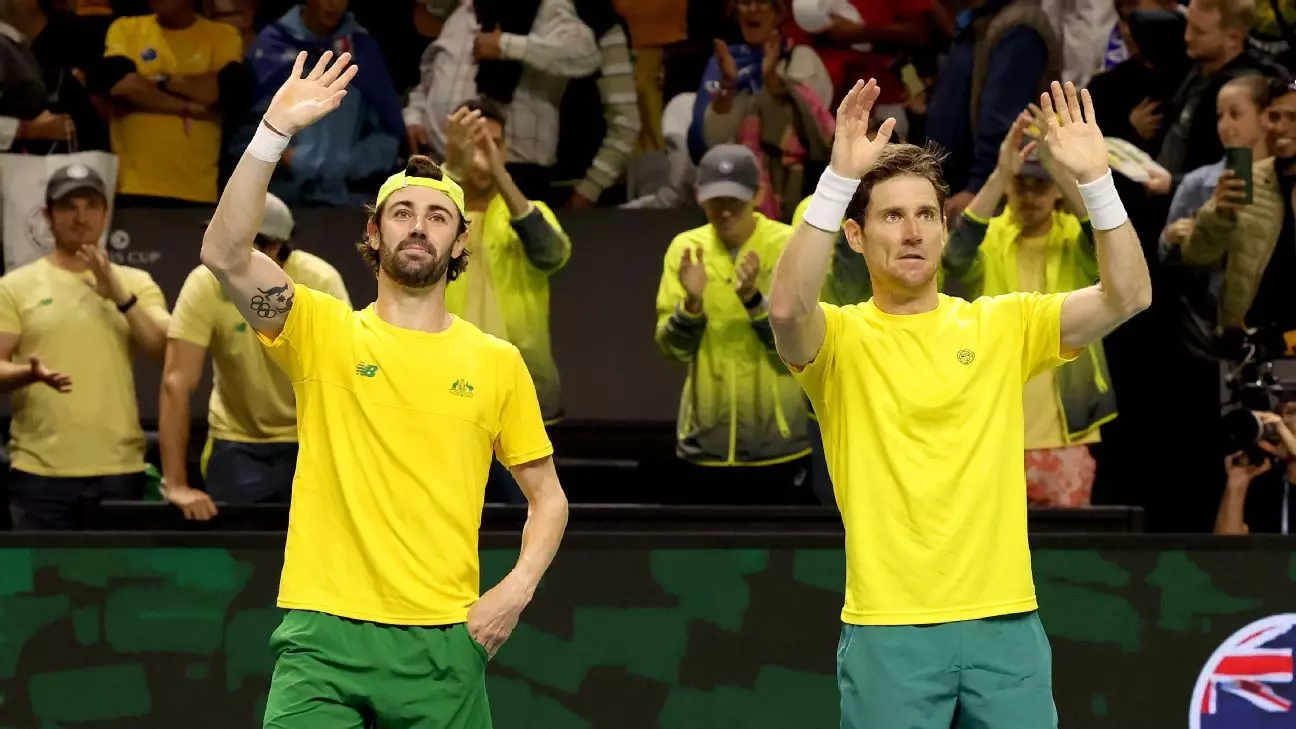The world of competitive tennis is often viewed through the lens of individual triumphs and failures, yet team events such as the Davis Cup add layers of complexity not typically seen in standard tournaments. The recent Duplicity of decision-making around the U.S. Davis Cup team’s match against Australia starkly illustrates the delicate balance between strategy and execution in high-stakes sports. With Bob Bryan at the helm as captain, the choice to switch a seasoned doubles pairing for a couple of singles players ended in disappointment, drawing attention to the intricate dynamics that often go unnoticed in team play.
The choice to field Tommy Paul and Ben Shelton, two singles specialists, over the proven duo of Austin Krajicek and Rajeev Ram was made with the intention of shocking the Australian team. Bryan’s rationale derived partly from the belief that a surprise element would yield a tactical advantage. However, from the outset, this gamble appeared deeply flawed. Australian captain Lleyton Hewitt, seeing the strategic switch coming, was unfazed. “It wasn’t a surprise,” he stated, underlining a significant point: effective preparation often involves anticipating not just one’s own plays, but those of the opposition as well.
In competitive sports, the psychological dimension cannot be overstated. The duality of being surprised while also preparing for the foreseeable is an integral aspect of strategy. Yet in this case, Bryan’s strategy ultimately provided the Australians with more than just a tactical edge; it also delivered a significant morale boost. A well-coordinated duo, particularly one with previous collaboration experience, usually trumps individual talent—a maxim that was starkly validated in this pivotal match.
Both Paul and Shelton may excel in singles, having seen success in major tournaments, but their lack of experience as a doubles team significantly hampered the American prospects. Their formidable skills did not translate into effective teamwork, as demonstrated by their straight-sets loss to Matthew Ebden and Jordan Thompson. Having only played together once previously—at the 2023 Miami Open—was a major liability against seasoned doubles specialists who possess not just skill but also the intuitive synergy that comes with cohesive team play. Doubles requires a level of understanding and adaptability that can only come with experience, aspects that Paul and Shelton were evidently missing.
Moreover, the contrasting levels of previous success in doubles between the U.S. players and their opponents should not be overlooked. Ebden and Thompson both bring Grand Slam titles won with different partners. The contrast in experience could not have been more pronounced. While Bryan’s intent to mix things up could be viewed as innovative, the resulting loss highlights the importance of establishing a clear hierarchy in team selection based on merit and experience, not solely potential.
The U.S. Davis Cup team’s protracted absence from the semifinals—last reached in 2018—has continued to magnify the pressure on its players and coaching staff alike. The fact that this defeat marks the 17-year stretch since their last championship—again underlining Bryan’s involvement at that time—illuminates the challenge of recapturing the glory of the past. The ramifications of each defeat extend beyond the immediate loss; they are intricately tied to the team’s legacy, creating a psychological burden that players inevitably carry onto the court.
Bryan acknowledged the challenging task of culling insights from practices and previous matches while balancing situational factors that could impact performance. “It’s a world of analytics,” he commented, recognizing that data-driven decision-making can often hinge upon incomplete information. The critical errors made during this match may serve as a powerful lesson moving forward: the importance of maintaining balance between statistical analysis and the subjective insights that come from experience and history.
Moving Forward: Strategic Reflections
As the team reflects on this latest setback, questions arise—could different decisions have yielded a more favorable outcome? Will Bryan adjust his strategies in future matchups to leverage the collective strength of his players more effectively? While one defeat in the Davis Cup may not define the U.S. team’s future, it certainly creates an opportunity for introspection and growth. The dynamics of teamwork in tennis will always remain complex, reminded by this match that even the most accomplished can falter.
Ultimately, the essence of sports lies not just in winning, but also in learning and evolving. The road ahead for the U.S. tennis team is illuminated by both their rich past and the prospects of tomorrow; the challenge is to ensure that past missteps do not perpetuate future failures.

